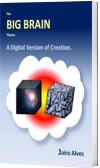My name is Jairo Alves, I was born in Santos/SP in
1956. I always worked in electronic data processing and
telecommunications. I spent nearly 36 years working in the biggest Brazilian
telecommunications companies.
I've always been very observant, curious and
questioner. Very early, I realized that everything in nature
was logical and interdependent. Later, I have learned that
almost everything could be explained by science and translated into numbers. However, I felt extremely disappointed when I tried
to find out what happens after death. All information I had got
did not match the logic of nature.
My interest in what happens after death was so great that I even decided
to get my answers. I read virtually everything with some connection to this subject. I discovered many logical things, but they did not integrate, something
was missing. Then, a book of Hegelian philosophy of Brazilian teacher Djacir Menezes
led me to a more pragmatic view of nature. From that
moment, I decided to pay more attention to everything related to this
viewpoint.
In 1975 while conducting a training of telegraph for work in the network
of coastal stations I thought: "The secret to the materialization of
intelligible forms is here." However, I found nothing. Later, in
1982, I developed a computer program to automate our duty roster. It was a great surprise when I realized that this program was I needed
to explain how nature works.
I was convinced by the General Theory of Systems of Karl Ludwig Von
Bertalanffy that nature could only be understood when studied as an immense
system in which everything is perfectly integrated. To improve my
view of systems, I post-graduated myself in systems analysis and migrated to
the data processing area. Later, I migrated to the area of networking, because
I realized that it could provide complementary subsidies to broaden my vision,
and help me to understand the structure of nature a little bit more.
It took nearly 34 years of research and many failed attempts to find
some variables that could support the work of nature. To understand
the role of each of them and write the Big Brain Theory took me five years
more. Now, I can say that Schopenhauer was right: “Thus, the task is not so
much to see what no one yet has seen, but to think what nobody yet has thought
about that which everybody sees.” Reading the Big Brain Theory is indispensable
for anyone who yearns for logical answers to the big questions of life. It is
the only book able to provide a 100% logical worldview.


Synopsis of the book
